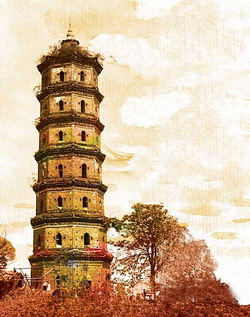|

The success of Huizhou merchants had no doubt played a decisive part in the emergence and growth of Huizhou culture. Huizhou merchants generally refer to businessmen from the six counties under Huizhou Prefecture-Shexian, Xiuning, Qimen, Yixian, Jixi and Wuyuan. Most researchers believe that Huizhou merchants as a whole came into being in the southern Song Dynasty (1127~1279 ) ), began to develop between the late Yuan (1271~1368) and the early Ming dynasty (1368~1644), formed a power around mid-Ming period, flourished during Jiajing's reign (1522~1567), reached their culmination during Qianlong's reign (1736~1796), and then declined during Jiajing's and Daoguang's reigns (1796~1851).
The history of Huizhou merchants covers about 600 years, and for 300 years they dominated the region. They occupy a significant place in the history of Chinese commerce. In the Southern Song Dynasty, as the capital was moved from Kaifeng to Lin'an (now Hangahou), the political and economic centre shifted to the south. this stimulated the economy of neighboring areas to develop, and then the Central Plains culture was introduced to the South. Huizhou was situated in an important place between Dingus and Zhejiang Provinces. It was significant to the economy of southeastern China as a communication hub between the south and the North. As a result of Huizhou's particular geographical condition and the need of economic development, landowners began to take up business.
At the beginning of the Southern Song Dynasty, according to records, Huizhou people were "engaged in trade every where", selling tea, ink, paper and wood. After Jiajing's reign in the Ming Dynasty, the number of traders amounted to 70% of the total Huizhou population. As the saying goes, "It is a Huizhou practice that thirteen year-olds start their career in town and at seventeen they do business all over the country". Usually at the age of 12 or 13, Huizhou children began to work as apprentices in town. The shortage of land and the superfluity of manpower drove the farmers away from farming. The Ming Dynasty Anhui Chronicle comments, "Many Huizhou people take up business, because they have no other choice". Generally they did small trading, and most of them were under the control of big business. They were not born merchants. Their success was a result of various social factors and their painstaking efforts. the Huizhou Chronicle of the Jiaqing years (1796~1821) describes them as "properly dressed, well-spoken", "fully aware of prices, knowing when to buy and sell, and gaining extra profits from selling local goods at other places". The earliest people who left Huizhou to "make a living away from home" never suspected that a flourishing Huizhou business would "spread almost all over the country", and that Huizhou merchants would "gain a national fame".
|
|